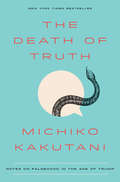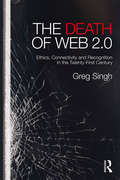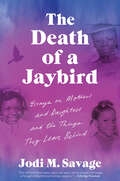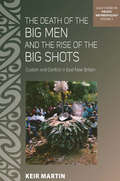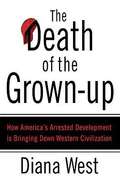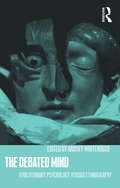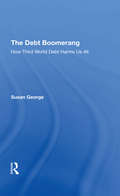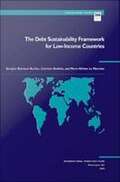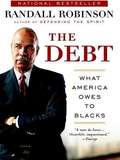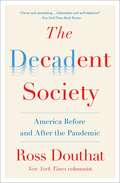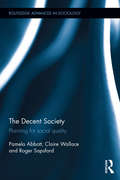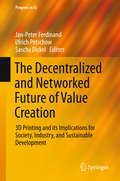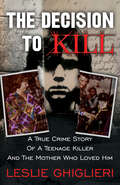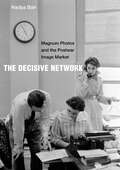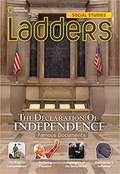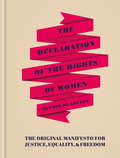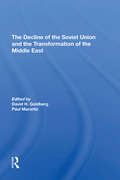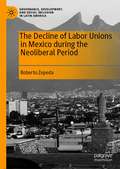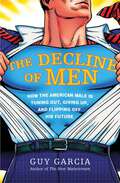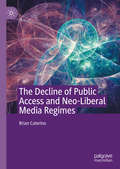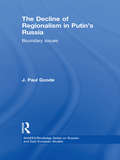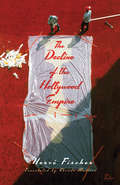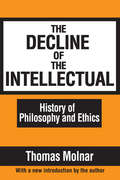- Table View
- List View
The Death of Truth: Notes on Falsehood in the Age of Trump
by Michiko KakutaniNEW YORK TIMES BESTSELLER • From the Pulitzer Prize–winning critic comes an impassioned critique of America&’s retreat from reasonWe live in a time when the very idea of objective truth is mocked and discounted by the occupants of the White House. Discredited conspiracy theories and ideologies have resurfaced, proven science is once more up for debate, and Russian propaganda floods our screens. The wisdom of the crowd has usurped research and expertise, and we are each left clinging to the beliefs that best confirm our biases. How did truth become an endangered species in contemporary America? This decline began decades ago, and in The Death of Truth, former New York Times critic Michiko Kakutani takes a penetrating look at the cultural forces that contributed to this gathering storm. In social media and literature, television, academia, and politics, Kakutani identifies the trends—originating on both the right and the left—that have combined to elevate subjectivity over factuality, science, and common values. And she returns us to the words of the great critics of authoritarianism, writers like George Orwell and Hannah Arendt, whose work is newly and eerily relevant. With remarkable erudition and insight, Kakutani offers a provocative diagnosis of our current condition and points toward a new path for our truth-challenged times.
The Death of Web 2.0: Ethics, Connectivity and Recognition in the Twenty-First Century
by Greg SinghWith all our contemporary connectivity, are we really connected? What does the nature of connectivity tell us about interpersonal and community relationships? What ethical concerns are raised through an always-on culture? Communication in today’s world is characterised by a condition of persistent, semi-permanent connectivity, which seems to bring us closer together, but which can also be profoundly alienating. The Death of Web 2.0 takes a retrospective look at a moment in recent media history that has had, and will continue to have, a lasting impact upon the predominant attitude towards cultures of connectivity. Greg Singh draws from a range of approaches, intellectual traditions and scholarly disciplines to engage key questions underpinning the contemporary communications media ecosystem. Bringing together influences from communitarian ethics, recognition theory and relational and depth psychology, Singh synthesises key approaches to produce a critical inquiry that projects the tensions at the heart of connectivity as a principle of Web 2.0. He argues that Web 2.0 is a cultural moment that is truly over, and that what is popularly described as 'Web 2.0' is an altogether different set of principles and practices. The Death of Web 2.0 recognises the consequences of our 'always-on' culture, where judgments are made quickly and where impacts can be far-reaching, affecting our relationships, wellbeing, mental health and the health of our communities, and it concludes by asking what an ethics of connectivity would look like. This unique interdisciplinary work will be essential reading for academics and students of Jungian and post-Jungian studies, media and cultural studies and psychosocial studies as well as anyone interested in the social implications of new media.
The Death of a Jaybird: Essays on Mothers and Daughters and the Things They Leave Behind
by Jodi M. SavageReminiscent of The Year of Magical Thinking and Somebody’s Daughter, a deeply empathetic and often humorous collection of essays that explore the author’s ever-changing relationships with her grandmother and mother, through sickness and health, as they experience the joys and challenges of Black American womanhood.Jodi M. Savage was raised in Brooklyn, New York, by her maternal grandmother. Her whip-smart, charismatic mother struggled with addiction and was unable to care for her. Granny—a fiery Pentecostal preacher who had a way with words—was Jodi’s rock, until Alzheimer’s disease turned the tables, and a 28-year-old Jodi stepped into the role of caretaker. It was up to Jodi to get them both through the devastations of a deteriorating mind. After Granny passed away, Jodi spent years trying to reckon with her grief. Jodi and her mother were both diagnosed with breast cancer nearly a decade later, and then Jodi lost her too.In this searing, candid collection of essays, Jodi illuminates the roles that identity and memory play in preserving those we love. Jodi explores the lives of modern Black women and communities through the prism of her personal experiences. With grace, creativity, and insight, she looks at femininity, family, race, mental illness, grief, healthcare, and faith. Jodi deftly portrays how trauma is inherited, and how the struggle to break a generational curse can last a lifetime.The Death of a Jaybird is a thoughtful examination of complicated family love, loss, and the liberating power of claiming our stories.
The Death of the Big Men and the Rise of the Big Shots
by Keir MartinIn 1994, the Pacific island village of Matupit was partially destroyed by a volcanic eruption. This study focuses on the subsequent reconstruction and contests over the morality of exchanges that are generative of new forms of social stratification. Such new dynamics of stratification are central to contemporary processes of globalization in the Pacific, and more widely. Through detailed ethnography of the transactions that a displaced people entered into in seeking to rebuild their lives, this book analyses how people re-make sociality in an era of post-colonial neoliberalism without taking either the transformative power of globalization or the resilience of indigenous culture as its starting point. It also contributes to the understanding of the problems of post-disaster reconstruction and development projects.
The Death of the Grown-Up: How America's Arrested Development is Bringing Down Western Civilization
by Diana West"WHERE HAVE ALL THE GROWN-UPS GONE?" That is the provocative question Washington Times syndicated columnist Diana West asks as she looks at America today. Sadly, here's what she finds: It's difficult to tell the grown-ups from the children in a landscape littered with Baby Britneys, Moms Who Mosh, and Dads too "young" to call themselves "mister. " Surveying this sorry scene, West makes a much larger statement about our place in the world: "No wonder we can't stop Islamic terrorism. We haven't put away our toys!" As far as West is concerned, grown-ups are extinct. The disease that killed them emerged in the fifties, was incubated in the sixties, and became an epidemic in the seventies, leaving behind a nation of eternal adolescents who can't say "no," a politically correct population that doesn't know right from wrong. The result of such indecisiveness is, ultimately, the end of Western civilization as we know it. This is because the inability to take on the grown-up role of gatekeeper influences more than whether a sixteen-year-old should attend a Marilyn Manson concert. It also fosters the dithering cultural relativism that arose from the "culture wars" in the eighties and which now undermines our efforts in the "real" culture war of the 21st century--the war on terror. With insightful wit, Diana West takes readers on an odyssey through culture and politics, from the rise of rock 'n' roll to the rise of multiculturalism, from the loss of identity to the discovery of "diversity," from the emasculation of the heroic ideal to the "PC"-ing of "Mary Poppins," all the while building a compelling case against the childishness that is subverting the struggle against jihadist Islam in a mixed-up, post-9/11 world. With a new foreword for the paperback edition, "The Death of the Grown-up,"is a bracing read from one of the most original voices on the American cultural scene.
The Debated Mind: Evolutionary Psychology versus Ethnography
by Harvey WhitehouseIn a further development of the nature-nurture debate, this collection of articles questions how the human mind influences the content and organization of culture. In the study of mental activity, can the effects of evolution and history be teased apart? Evolutionary psychologists argue that cultural transmission is constrained by our genetic inheritance. Few social and cultural anthropologists have found this argument to be relevant to their work and many would doubt its validity. This book uniquely pitches the arguments for innatism against ethnographic perspectives that call into question the theoretical foundations of orthodox evolutionary biology and cognitive science. Ultimately the aim of the debate is to create an original set of mutually compatible theories that will open up new areas for interdisciplinary research.
The Debt Boomerang: How Third World Debt Harms Us All (Transnational Institute Ser.)
by Susan GeorgeThis book examines six major 'Debt Connections'; six ways in which the third world 'Debt Boomerang' strikes the North as it flies back from the South: environmental destruction, drugs, costs to taxpayers, lost jobs and markets, immigration pressures, and heightened conflict and war.
The Debt Sustainability Framework for Low-Income Countries
by Christian H. Beddies Bergljot Barkbu Marie-Helene Le ManchecA report from the International Monetary Fund.
The Debt: What America Owes to Blacks
by Randall RobinsonThe national bestseller by the author of Defending the Spirit.In this powerful and controversial book, distinguished African-American political leader and thinker Randall Robinson argues for the restoration of the rich history that slavery and segregation severed. Drawing from research and personal experience, he shows that only by reclaiming their lost past and proud heritage can blacks lay the foundation for their future. And white Americans can make reparations for slavery and the century of racial discrimination that followed with monetary restitution, educational programs, and the kinds of equal opportunities that will ensure the social and economic success of all its citizens.In a book that is both an unflinching indictment of past wrongs and an impassioned call to our nation to educate all Americans about the history of Africa and its people, Robinson makes a persuasive case for the debt white America owes blacks, and the debt blacks owe themselves.
The Decadent Society: How We Became the Victims of Our Own Success
by Ross DouthatFrom the New York Times columnist and bestselling author of Bad Religion, a powerful portrait of how our turbulent age is defined by dark forces seemingly beyond our control Today the Western world seems to be in crisis. But beneath our social media frenzy and reality television politics, the deeper reality is one of drift, repetition, and dead ends. The Decadent Society explains what happens when a rich and powerful society ceases advancing—how the combination of wealth and technological proficiency with economic stagnation, political stalemates, cultural exhaustion, and demographic decline creates a strange kind of &“sustainable decadence,&” a civilizational languor that could endure for longer than we think. Ranging from our grounded space shuttles to our Silicon Valley villains, from our blandly recycled film and television—a new Star Wars saga, another Star Trek series, the fifth Terminator sequel—to the escapism we&’re furiously chasing through drug use and virtual reality, Ross Douthat argues that many of today&’s discontents and derangements reflect a sense of futility and disappointment—a feeling that the future was not what was promised, that the frontiers have all been closed, and that the paths forward lead only to the grave. In this environment we fear catastrophe, but in a certain way we also pine for it—because the alternative is to accept that we are permanently decadent: aging, comfortable and stuck, cut off from the past and no longer confident in the future, spurning both memory and ambition while we wait for some saving innovation or revelations, growing old unhappily together in the glowing light of tiny screens. Correcting both optimists who insist that we&’re just growing richer and happier with every passing year and pessimists who expect collapse any moment, Douthat provides an enlightening diagnosis of the modern condition—how we got here, how long our age of frustration might last, and how, whether in renaissance or catastrophe, our decadence might ultimately end.
The Decent Society: Planning for Social Quality (Routledge Advances in Sociology)
by Roger Sapsford Pamela Abbott Claire WallaceThe search for ‘the Decent Society’ – a fit place in which to live – has informed policy at both governmental and international level. This book analyses its nature and devises a consistent way of measuring the concept world-wide on the basis of a coherent theory of agency within social structure. Influenced by classical sociology and by the economist Amartya Sen, the book posits that societies need to create (a) economic security, (b) social cohesion, (c) social inclusion, and (d) the conditions for empowerment. The model is interactive and recursive; each component provides the requirements for each of the others. This book outlines the sociopolitical framework underlying ’the Decent Society' and summarises a decade of research, some of which has had a formative impact on governments’ policies. The first half contains studies of social quality based on surveys in the former Soviet Union and sub-Saharan Africa, while the second half describes the construction of a Decent Society Index for comparing very different countries across the world. This book and the index it develops will be of interest both to academics and researchers in sociology, politics, economics, psychology, social policy and development studies and to policy-makers in government, local government and the NGOs.
The Decentralized and Networked Future of Value Creation
by Jan-Peter Ferdinand Ulrich Petschow Sascha DickelThis book identifies, analyzes and discusses the current trends of digitalized, decentralized, and networked physical value creation by focusing on the particular example of 3D printing. In addition to evaluating 3D printing's disruptive potentials against a broader economic background, it also addresses the technology's potential impacts on sustainability and emerging modes of bottom-up and community-based innovation. Emphasizing these topics from economic, technical, social and environmental perspectives, the book offers a multifaceted overview that scrutinizes the scenario of a fundamental transition: from a centralized to a far more decentralized system of value creation.
The Decipherment of Linear B
by John ChadwickThe languages of the ancient world and the mysterious scripts, long undeciphered, in which they were encoded have represented one of the most intriguing problems of classical archaeology in modern times. This celebrated account of the decipherment of Linear B in the 1950s by Michael Ventris was written by his close collaborator in the momentous discovery. In revealing the secrets of Linear B it offers a valuable survey of late Minoan and Myceanean archaeology, uncovering fascinating details of the religion and economic history of an ancient civilisation.
The Decision to Kill: A True Crime Story of a Teenage Killer and the Mother Who Loved Him
by Leslie GhiglieriA family tragedy propels this gripping true crime debut as a mother searches for answers in the shocking murder of her husband—and conviction of her son.In the early morning of October 18, 1986, Cherie Wier’s life collapses when her teenage son takes the life of her beloved husband. For years, Cherie grapples with events preceding and following the crime, struggling to overcome the consuming grief she suffers from her loss and the difficulty she faces as she attempts to forgive her son. The courtroom accounts of gruesome details and the shocking testimonies from experts, only add to Cherie’s yearning to make sense of the crime. She is tormented, wanting to know how and WHY this tragedy happened and if there was anything she could have done to prevent it . . .
The Decisive Network: Magnum Photos and the Postwar Image Market
by Nadya BairSince its founding in 1947, the legendary Magnum Photos agency has been telling its own story about photographers who were witnesses to history and artists on the hunt for decisive moments. Based on unprecedented archival research, The Decisive Network unravels Magnum’s mythologies to offer a new history of what it meant to shoot, edit, and sell news images after World War II. Nadya Bair shows that between the 1940s and 1960s, Magnum expanded the human-interest story to global dimensions while bringing the aesthetic of news pictures into new markets. Working with a vast range of editorial and corporate clients, Magnum made photojournalism integral to postwar visual culture. But its photographers could not have done this alone. By unpacking the collaborative nature of photojournalism, this book shows how picture editors, sales agents, spouses, and publishers helped Magnum photographers succeed in their assignments and achieve fame. Bair concludes in the late 1960s and early 1970s, when changing market conditions led Magnum to consolidate its brand. In that moment, Magnum’s photojournalists became artists and their assignments oeuvres. Bridging art history, media studies, cultural history, and the history of communication, The Decisive Network transforms our understanding of the photographic profession and the global circulation of images in the predigital world.
The Declaration of Independence: Famous Documents [On-Level] (Ladders Social Studies 5)
by Anne Goudvis Andrew MilsonNIMAC-sourced textbook <P><P>Articles for the National Geographic Famous Documents Series. Articles include the Road to Freedom, Highlights of the Declaration, Declaration's Influence.
The Declaration of the Rights of Women: The Originial Manifesto for Justice, Equality and Freedom
by Olympe De GougesOlympe de Gouges was the most important fighter for women's rights you've never heard of. An activist and writer in revolutionary Paris, she published 'The Declaration of the Rights of Women' in 1791, and was beheaded two years later, her articulate demands for equality proving too much for their time.<P><P>Over one hundred and fifty years later, the key statements of her declaration were internationally endorsed by the United Nations in its Declaration on the Elimination of Discrimination Against Women, which in turn went on to be legally recognized by nearly every country in the world. <P>This volume presents both of these key texts along with enlightening and inspiring commentary from a host of powerful women, from Virginia Woolf to Hillary Clinton.
The Declaration of the Rights of Women: The Originial Manifesto for Justice, Equality and Freedom
by Olympe de GougesOlympe de Gouges was the most important fighter for women's rights you've never heard of. An activist and writer in revolutionary Paris, she published 'The Declaration of the Rights of Women' in 1791, and was beheaded two years later, her articulate demands for equality proving too much for their time.Over one hundred and fifty years later, the key statements of her declaration were internationally endorsed by the United Nations in its Declaration on the Elimination of Discrimination Against Women, which in turn went on to be legally recognized by nearly every country in the world. This volume presents both of these key texts along with enlightening and inspiring commentary from a host of powerful women, from Virginia Woolf to Hillary Clinton.
The Decline Of The Soviet Union And The Transformation Of The Middle East
by Stephen Page David Howard Goldberg Paul Marantz Stephen GotowickiFor more than three decades, the Soviet Union was a major force in the Middle East, and superpower rivalry exacerbated many of the conflicts endemic to the region. The end of the Cold War and the collapse of the Soviet Union have fundamentally altered the rules of the game in Middle East politics, producing a new fluidity in the region, new diplomatic alignments, and new opportunities for peace. The contributors place recent developments in historical and political context, analyzing changes in Soviet Middle East policy under Gorbachev as well as evaluating developments since the demise of the Soviet Union. The evolution of Moscow's policy toward the Arab states, Israel, the P.L.O., and the U.N. is given special attention. The contributors also examine the emergence of Islamic fundamentalism in the new states of Central Asia and weigh the potential implications of this development for the Middle East. In addition, they discuss security issues related to the transfer of military technology from former Soviet republics to the countries of the Middle East.
The Decline of Labor Unions in Mexico during the Neoliberal Period (Governance, Development, and Social Inclusion in Latin America)
by Roberto ZepedaThis book examines the most significant factors accounting for the decline of union density during the neoliberal period, focusing on the case of Mexico. Union density, which reflects the representation of labor unions in the employed labor force, is one of the main indicators of union strength. The relation of organized labor with the state and the political system are also considered. The analysis is framed within a structure concentrated on cyclical, structural and political-institutional factors linked to labor union performance. Over the last decades, the transformations brought about by neoliberalism and democratization reshaped many features of the domestic political and economic model in Mexico. Therefore, an examination of these developments regarding the repercussions of the factors linked to union density decline is crucial.
The Decline of Men: How the American Male Is Getting Axed, Giving Up, and Flipping Off His Future
by Guy GarciaWhy are so many of today's supermen super-clueless?Why do so many men prefer the escapist digitized world of Spike TV and Grand Theft Auto to the reality of their own lives?An entire generation of men is slacking off. The struggle to redefine what being a man means in today's world has resulted in widespread male confusion, leading to rampant malaise, alienation, and disconnection. In this eye-opening exploration of this crisis of contemporary American manhood, award-winning journalist Guy Garcia sheds light on a problem that has wreaked havoc on the American family. Packed with startling statistics, informed by pop culture, and narrated in the entertaining style for which Guy Garcia is known, The Decline of Men is an important wake-up call to the distressing reality of the American male
The Decline of Public Access and Neo-Liberal Media Regimes
by Brian CaterinoThis book examines the reasons behind the declining fortunes of public access channels. Public access, which provided perhaps the boldest experiment in popular media democracy, is in steep decline. While some have argued it is technologically outmoded, Caterino argues that the real reason lies with the rise of a neo-liberal media regime. This regime creates a climate in which we can understand these changes. This book considers the role of neo-liberalism in transforming notions of public obligations and regulation of media that have impacted non-profit media, specifically public access. Neo-liberalism has tried to eliminate public forums and public discourse and weakens institutions of civil society. Though social media is often championed as an arena of communicative freedom, Caterino argues that neo-liberalism has created a colonized social media environment that severely limits popular democracy.
The Decline of Regionalism in Putin's Russia: Boundary Issues (BASEES/Routledge Series on Russian and East European Studies)
by J. Paul GoodeThis book reassesses Putin's attempt to reverse the decentralization of power that characterised centre-regional relations in the 1990s, focusing on regional responses to Putin's federal reforms. It explains the decline of regionalism after 2000 in terms of the dynamics of regional boundaries, understood as the juridical boundaries which demarcate a region's territorial extent and its resources; institutional boundaries that sustain regional differences; and cultural boundaries that define the ethnic or technocratic principles on which a region could claim legitimate existence. The book questions the conventional wisdom regarding the success of Putin's regime. It shows how regional governors responded not by attempting to deflect the reforms with outright resistance, but by mimicking Putin's centralisation of power at the regional level. In turn, this facilitated the homogenisation of regional political regimes and regional mergers. The book demonstrates how the reordering of regions advanced sporadically, how pockets of resistance persist, and how the potential for the revival of regionalism continues.
The Decline of the Hollywood Empire
by Hervé FischerThe Hollywood empire was built over the course of a century through hard-nosed business practices such as block booking, dumping and buying up the competition, turning the silver screen into a goldmine in the process. The business logic that has driven the industry since its beginnings has gone into hyperdrive in recent years, with astronomical sums invested in productions and promotion. Ironically that massive outlay has gone toward churning out a flat, made-in-Hollywood universalism that can be exported planet-wide, but which is simultaneously losing audiences, primarily to the digital world, at an accelerating pace. The apparently insurmountable barriers of finance and distribution to entry into the world of entertainment have served, so far, to keep smaller players out of the frame and, Fischer contends, have destroyed the industry's creative potential. It turns out too much money can kill cinema just as certainly as not enough. In The Decline of the Hollywood Empire, artist and philosopher Hervé Fischer heralds an inevitable move from 35 mm to digital distribution, which will take what has until now existed only on the margins of the "entertainment industry"--independent film, amateur film, documentary and other genres--from bit players to starring roles: how the Trojan horse of digital technology and distribution, in the hands of independent producers, could well toll the bell for Hollywood's hegemony in the business of film.
The Decline of the Intellectual
by Thomas MolnarIn perhaps his most famous book, The Decline of the Intellectual, Thomas Molnar launches into a fundamental critique of the intellectual class. He sees it as a group that had lost its way, collapsing a sense of vision into political activism, social engineering, and culture manipulation, and abandoning the writing, philosophizing, and scholarship that had occupied their predecessors. Universities began to produce factory-like, faceless citizens, as the job market became the arbiter of education and culture. Today's professors are recruited from this group of job seekers, and hence, have a shared indifference toward learning.Molnar likens present-day intellectuals to the earlier Marxists who elaborated their Utopian model in the Communist party. The campus intellectuals' objective is to transform the university into a replica and a laboratory of the ideal society. Colleges and universities thus become sources of propaganda of various political, financial, cultural, and ideological trends, not only among students, but professors as well. The thirty years separating editions have done nothing to weaken such a critical appraisal.In his new introduction, Molnar writes that the decline of intellectuals has extended outside of the campus to the arts, the public discourse, and the robotization caused by technology. On the initial publication of this work, Frank S. Meyer wrote in Modern Age, Thomas Molnar's book is not only true; it is intellectually exciting and it will remain a necessary handbook for anyone interested in the decisive problem of the 20th century. The Decline of the Intellectual is essential reading for sociologists, political scientists, educators, and university officials. It is the basis of present-day critiques of the academic world.
